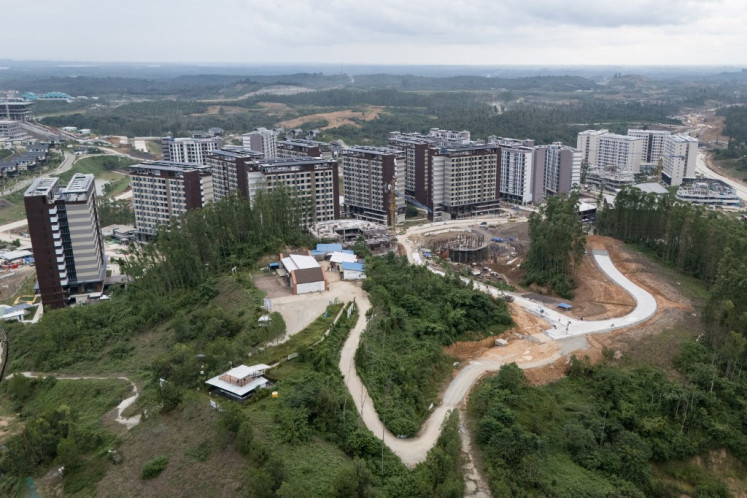Popular Reads
Top Results
Can't find what you're looking for?
View all search resultsPopular Reads
Top Results
Can't find what you're looking for?
View all search resultsElectric unicycles, new way to beat traffic
Commuting in style: People use electric unicycles as an alternative vehicle for short-distance trips
Change text size
Gift Premium Articles
to Anyone
C
span class="caption">Commuting in style: People use electric unicycles as an alternative vehicle for short-distance trips. The unicyclists see the vehicles as a convenient solution to counter the city’s traffic congestion.(Courtesy of Airwheel Indonesia)
Worsening traffic congestion in most parts of Jakarta, especially during peak hours, has prompted Jakartans to look for more convenient ways to commute.
The already packed modes of public transportation — Transjakarta buses and the commuter line — are, however, still far from most Jakartans’ expectations.
To travel relatively short distances, people often opt to walk or ride bicycles. Now, they have another option: Electric unicycles, also known as airwheels.
Instead of sitting on a seat, an electric unicyclist stands on footholds either side of the solitary wheel. And instead of pedaling, riders only need to lean their bodies forward or backward to make the electric unicycle move.
“[Using an electric unicycle] taught me to maintain my balance and has helped me exercise my calf muscles,” said Agus Santoso, 29, who has been an electric unicyclist for the last three years.
He told The Jakarta Post recently that he had switched his means of transportation, especially for short distances, from a car or motorcycle to the electric unicycle.
“I’ve frequently used the unicycle to run errands from my house in Pulo Gebang to Jatinegara [both in East Jakarta],” he said. The distance of this journey is around 13 kilometers.
Another electric unicyclist, Isma, 31, said he was not a frequent user but had joined a unicyclist community. He works as a technician for an official distributor company of an electric unicycle brand.
For the last four years, Isma has carried his electric unicycle in the trunk of his car. Anytime the roads are congested, he parks his car at the nearest building and continues his trip by unicycle. If he gets bored or tired, he puts the device in his backpack and switches to using a bus or train.
“There are no guarantees that ensure the safety of regular cyclists, let alone unicyclists. We just do what we think is safest to commute,” he said, noting that he used both main roads and sidewalks while traveling on his electric unicycle.
Similar to regular cyclists, electric unicyclists should wear safety equipment, including a helmet and closed-toe shoes.
The electric unicycle, which can reportedly reach a maximum speed of 18 kilometers per hour, has a rechargeable battery and can carry a 120-kilogram person.
Although no road accidents involving unicyclists have occurred as yet, Isma warned his fellow unicyclists to stay mindful while riding the vehicle.
Incidents involving bicycles and cars remain common in the capital with 110 incidents recorded in 2016 and 85 last year.
An accident last Saturday, in which a speeding car hit two cyclists on Jl. Gatot Subroto, South Jakarta, at around 6:20 a.m., resulted in the death of Sandy Syafiek, a Bekasi resident and TV producer. The second victim, Maulana Aditya, suffered light injuries.
Both Isma and Agus said they enjoyed attracting the attention of passersby as they rode their unicycles.
“I feel like a celebrity,” said Isma.
Among the onlookers, Isma added, were police officers who often asked him to stop.
“At first I thought I had violated a traffic law and the policeman would ticket me. It turned out, he only wanted to ask what kind of vehicle I was using and whether he could give it a try,” he said laughing.
Unfortunately, only members of the middle class have the privilege of being able to afford the device, as it retails at more than Rp 5 million (around US$370) per unit.
However, Airwheel Indonesia community head Mulyati Ade said she had observed increasing demand from the public in the last two years. The unicycle community has hundreds of members, who mostly reside in the Greater Jakarta area.
“People of all ages enjoy riding electric unicycles. But currently, the most common users are young adults who use them for recreation,” she said.
The community, Mulyati added, had emerged and expanded as urbanites started paying closer attention to environmental issues.
Optimistic electric unicycle fans expect the new vehicle to be a game changer for transportation. Not only is electric unicycling a way to commute in style but its wider adoption could help the government disentangle traffic congestion and promote a cleaner environment. (vla)










